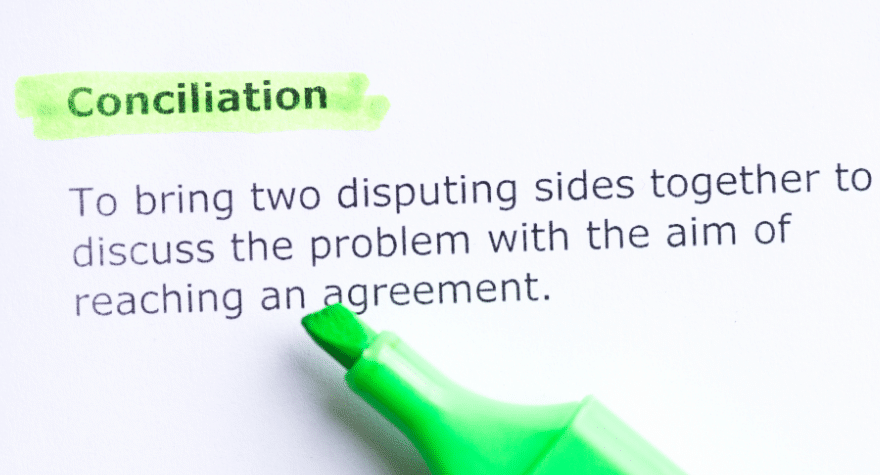
The Fee Is Free Unless You Win.
Top Rated Employment Law Firm
Protecting Families Since 1995
$450 Million Won
TABLE OF CONTENTS
You have received a Letter of Conciliation. What does that mean? A Letter of Conciliation means the EEOC found evidence to support your claim of discrimination or sexual harassment. More than evidence, they found “reasonable cause” that discrimination occurred.
As a victim of employment discrimination or sexual harassment, you have the right to file a charge with the Equal Employment Opportunity Commission (EEOC). The EEOC will conduct an investigation and render a decision regarding your next steps. One of these steps may be conciliation. Conciliation allows you to settle your claim without a lengthy and costly court proceeding.
Conciliation is an EEOC form of mediation or alternative dispute resolution. The conciliation gets offered to you if the EEOC finds evidence of discrimination or sexual harassment through their investigation.
You can choose to deny conciliation and file your complaint in federal court. However, if you choose to continue with conciliation, you will go through the EEOC process.

As the victim of employment discrimination or sexual harassment, you have the right to seek compensation. Many times that begins with filing a charge with the EEOC. An EEOC charge can be filed online, in person, or through US Mail.
Once the EEOC receives your charge, an intake specialist will schedule an interview with you. The specialist will also notify your employer of the charge and interview them to get the other side of the story.
Once you and your employer complete your interviews, the investigation can proceed. The EEOC will ask for any supporting documents you may have. They will speak with witnesses. They may even visit your worksite.
During this time, you will have the option to mediate your charge with your employer and settle your case. However, it is not mandatory. The EEOC will offer mediation at the beginning of the process. However, you can request it at any time throughout the process.
After the investigation, the EEOC will issue its determination. You may receive a Dismissal of Notice of Rights. This letter states that the EEOC found no evidence to support your claim of discrimination or harassment.
You may get a Letter of Determination. This letter says that the EEOC investigator either found evidence to support your claim or the investigation was inconclusive.
If the finding was inconclusive, you will receive the Notice of Right to Sue, which provides you the right to file suit in federal court. If the EEOC found evidence of discrimination or sexual harassment, you will receive a Conciliation letter.
Discover how our expertise has helped clients overcome their legal challenges and achieve successful outcomes.
View All TestimonialsOlivia is the best! Oliva was very thorough, patient, and very detailed and descriptive regarding the process. She was very supportive of my sexual harassment case. From the very beginning, she communicated and would provide me with any updates and she was always available when I needed anything. More importantly, she always extended that comfort level of trust which always made me feel at peac... Read Full Testimonial
Casey Barkhordarian is a fabulous attorney to work with. He explained everything to me about the case (including the millions of questions I asked) right from the start of our very first meeting. He did so in a way that I could understand and was very prompt and clear with communication the entire time. Casey Barkhordarian is a very competent and knowledgeable lawyer to have on your team. I def... Read Full Testimonial
Matt Finkleberg is by far the best attorney I’ve ever hired! From the outset, it was evident that he was not just another lawyer; Matt is nothing short of extraordinary. He possesses the ability to do his job phenomenally while somehow managing to give me hope during one of my darkest of hours. Matt consistently returned my calls promptly, regardless of my questions, confusion, or self-doubt ... Read Full Testimonial
I cannot speak highly enough about my experience working with Matt Finkelberg. From the very beginning, Matt approached my case with an incredible level of professionalism, knowledge, and dedication that immediately put me at ease. It is rare to find an attorney who not only possesses an impressive depth of legal expertise but who also truly cares about the well-being and best interests of thei... Read Full Testimonial
Olivia is absolutely outstanding! She understands the emotional side of your case while being able to find the legal aspects of holding the employer accountable for breaking the law! Made a really terrible situation a little easier by explaining everything and helping me get everything in order and in the right hands. I would not use anyone else! Call them for any sexual harassment case... You ... Read Full Testimonial
This law firm is absolutely amazing!!! They went so above and beyond for me!!! I am so grateful for all their help with my difficult case!!! If you need a lawyer, you will be in great hands with their firm!!! And wait until you see the office! The building is so high tech I couldn't figure out how to get in the elevator lol!
It was a pleasure to have Casey represent and help me for my employment case. It was my first time needing an attorney, so I was a bit apprehensive at first – Casey took the time to answer all of my questions and fully explain everything to me, which really put me at ease. He was very attentive, supportive, and knowledgeable throughout the whole process – Casey would ask questions to ensure... Read Full Testimonial
matt is an excellent attorney. he handled my case with the utmost care and highly exceeded all expectations. i could not recommend derek smith and esp. matt finkelberg enough
matt is an excellent attorney. he handled my case with the utmost care and highly exceeded all expectations. i could not recommend derek smith and esp. matt finkelberg enough 🙂
Matt handled a suit against the City of LA and members of the a Neighborhood Council for racial discrimination and harassment. Ths was the first suit of this type filed on a Neighborhood Council Matt handled it with poise and above all professionalism. He walked me through the 3 year process and above all provided moral support and encouragement as I still experienced racism and harassment duri... Read Full Testimonial
Matt Finkelberg is Amazing and Devotional! It was a pleasure to have Matt represent me for my employment case. He was very attentive, supportive, and knowledgable throughout the whole process. Whenever I reached out he responded promptly which I greatly appreciated. Matt fought diligently and hard throughout my case to make sure my case was represented best. Thank you again Matt for everything.... Read Full Testimonial
It was a pleasure to have Casey represent and help me for my employment case. It was my first time needing an attorney, so I was a bit apprehensive at first – Casey took the time to answer all of my questions and fully explain everything to me, which really put me at ease. He was very attentive, supportive, and knowledgeable throughout the whole process – Casey would ask questions to ensure... Read Full Testimonial
Our dedicated attorneys are ready to fight for your workplace rights and ensure justice!
The process of conciliation begins with an explanation. The EEOC will explain to you and your employer what evidence they found that led to the Letter of Determination. Then, the EEOC will attempt to settle with your employer. The EEOC takes on the role of your representation for the conciliation process.
The Settlement Process
Your employer may choose to agree to a settlement. A settlement may be financial. It can also result in enforceable actions, such as changing policies and procedures. The EEOC will work with your employer and try to complete the settlement process.
As with any legal process, your employer is entitled to his day in court. This entitlement means it is within the employer’s rights to deny the settlement offer.
If your employer denies the settlement offer, one of two things may happen:
The EEOC Litigation
The EEOC rarely files litigation. As a matter of fact, they may file a lawsuit in 8% of the total unresolved conciliation cases. If the charge is severe or the case will make a large impact on the future of how the EEOC makes decisions, it will choose to file the lawsuit on your behalf. Doing so allows them to work in the interest of the public.
The Notice of the Right to Sue
If the EEOC charge is not severe or the findings will not affect the greater good, the EEOC will issue you a Right to Sue Letter. When you receive the letter, you have 90 days to file your discrimination or harassment lawsuit without the EEOC’s further involvement.
Conciliation is a legal, binding proceeding. Therefore, you should have an attorney to guide you through the process. Your attorney can advise you whether you should consider conciliation or move forward with a federal lawsuit. They can ensure you do not give up your rights to justice and compensation in the process.
You have the right to file an EEOC charge. You also have the right to hire an attorney to navigate the process on your behalf. Your attorney can file your charge and handle all issues that arise throughout this period. If you are the victim of employment discrimination or sexual harassment, the experienced sexual harassment and employment discrimination attorneys at the Derek Smith Law Group can help.
Did You File an EEOC Charge for Discrimination or Sexual Harassment? Did the EEOC Offer Conciliation to Settle Your Charge? Please Call Us at 800.807.2209 to Learn More About Your Rights.

Our experienced legal team provides reliable services in key U.S. cities, ensuring expert assistance for workplace discrimination and employment law matters wherever you are located.
 New York City
New York City
 New Jersey
New Jersey
 Philadelphia
Philadelphia
 Miami
Miami
 Los Angeles
Los Angeles
 San Francisco
San Francisco
 San Diego
San Diego
 Washington DC
Washington DC